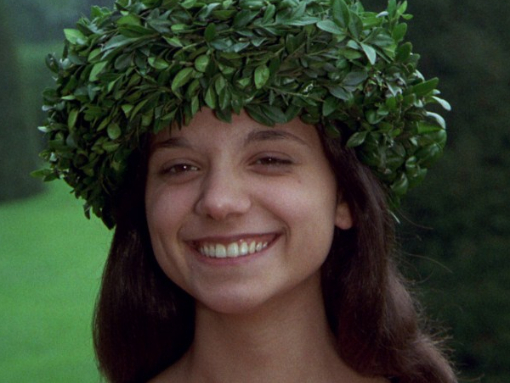
See more details, packaging, or compare
Synopsis
In the early 1970s, the great Italian poet, philosopher, and filmmaker Pier Paolo Pasolini brought to the screen a trio of masterpieces of medieval literature—Giovanni Boccaccio’s The Decameron, Geoffrey Chaucer’s The Canterbury Tales, and The Thousand and One Nights (often known as The Arabian Nights)—and in doing so created his most uninhibited and extravagant work. In this brazen and bawdy triptych, the director set out to challenge modern consumer culture and celebrate the uncorrupted human body, while commenting on contemporary sexual and religious mores and hypocrisies. Filled with scatological humor and a rough-hewn sensuality that leave all modern standards of decency behind, these are carnal, provocative, and wildly entertaining films, all extraordinarily designed by Dante Ferretti and featuring evocative music by Ennio Morricone.
Picture 8/10
Criterion presents Pier Paolo Pasolini’s Trilogy of Life in a brand new Blu-ray box set. The set includes The Decameron, The Canterbury Tales, and Arabian Nights. Each film is presented on its own dual-layer disc in its original aspect ratio of 1.85:1. Each film also receives a new 1080p/24hz high-definition transfer.
All three transfers look quite good, each delivering an incredibly filmic presentation. All three are stable and clean, and other than The Canterbury Tales, which suffers from some minor pixilation when rendering the film’s grain, none of them present any digital artifacts of note. Colours are rich and deep, and black levels are pretty strong. Definition is terrific, with crystal clear finer details. Arabian Nights does suffer from softness, primarily in scenes using optical effects, but this looks to be more of an issue with the source rather than the transfer. Film grain is present in all three films and does get a bit heavy in a few quick scenes, but its otherwise never distracting and looks natural most of the time.
The condition of the source materials are strong and, judging from clips used in the various supplements found throughout the set, a great amount of effort has been put into the restoration. Blemishes are very rare, limited to minor marks, bits of dirt, and a stain or two. Arabian Nights suffers from some more heavy damage in the scenes employing optical effects but I feel little could have been done to correct this. Canterbury Tales presents some rather pesky tram lines during the last third of the film, but they're generally easy to overlook.
Overall all three are very pleasing, and despite some minor flaws in the source prints, the digital transfers themselves are excellent.
Detailed reviews for each title:
The Decameron, The Canterbury Tales, Arabian Nights


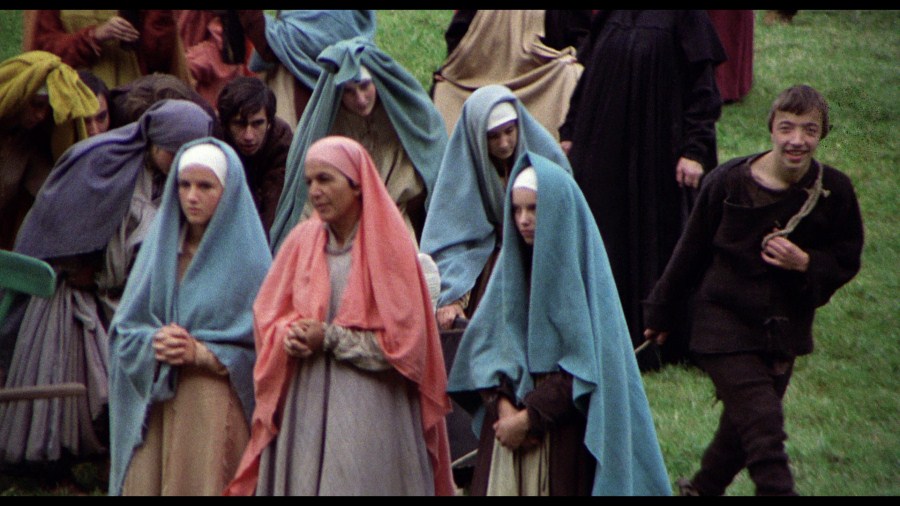
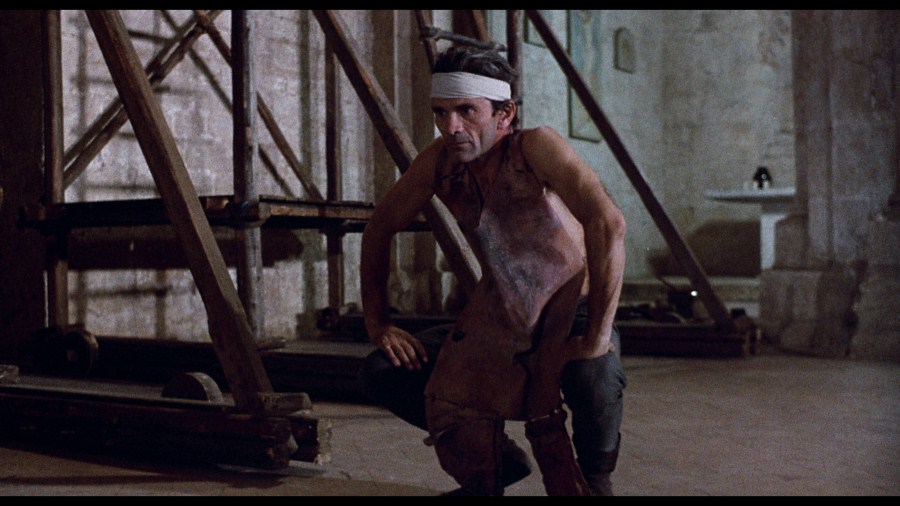


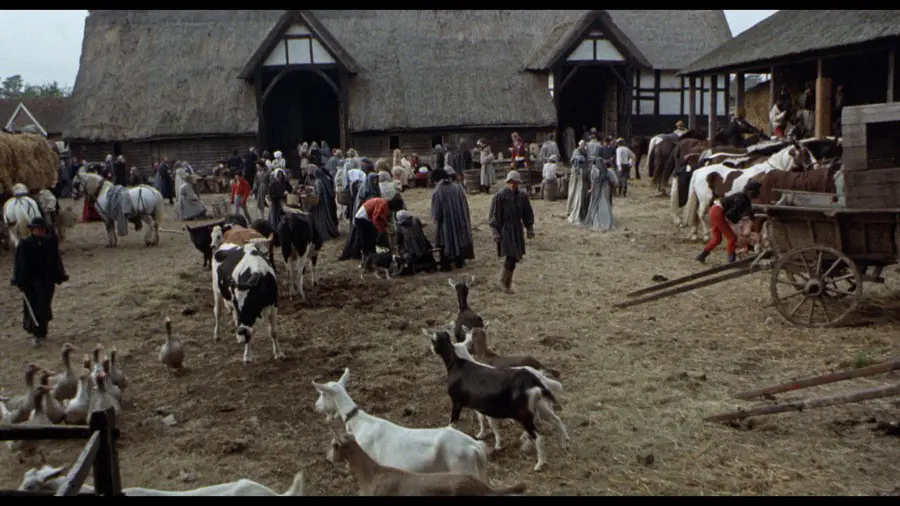


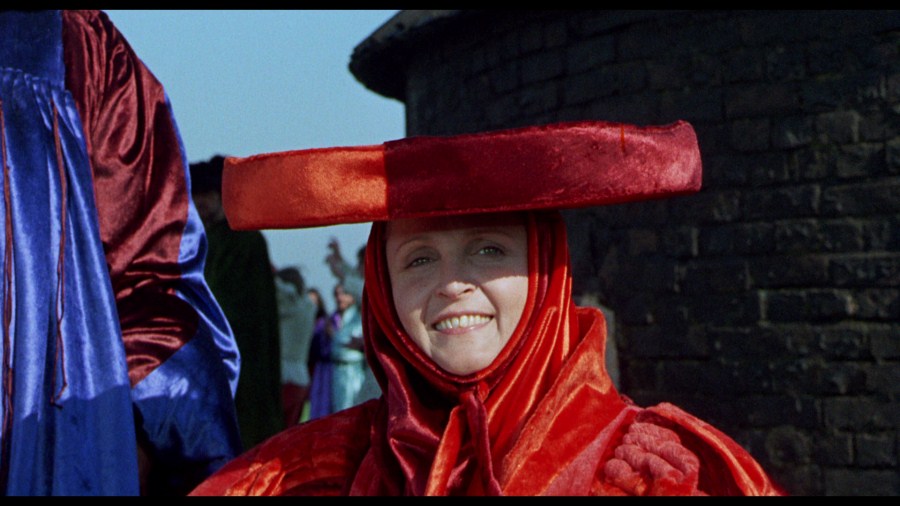





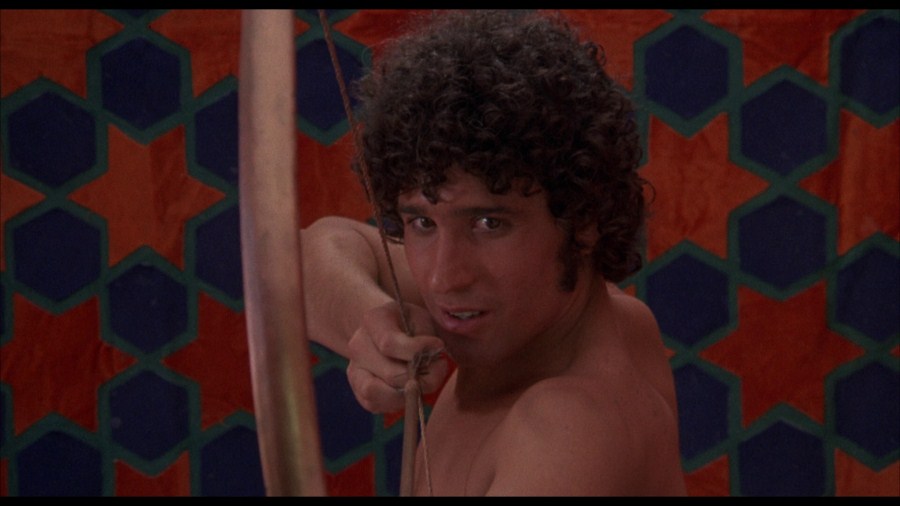

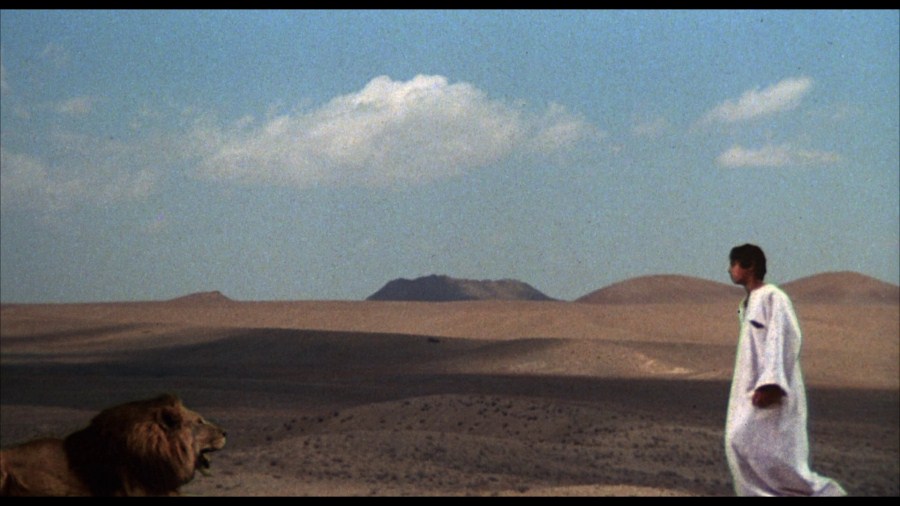


















Audio 6/10
All three films come with lossless Italian linear PCM 1.0 mono tracks. They all come off a bit flat and lack fidelity but they are serviceable, delivering sharp dialogue and clean music. Distortion isn’t a concern and all of the tracks are free of noise and damage. The only truly obvious problem is that all three films were dubbed during post-production. This is less of an issue in Arabian Nights as lip movements mostly match dialogue, but the other two, Canterbury Tales in particular (which was filmed with a primarily English speaking cast) have lip synch issues. This of course creates a very detached feel for the film.
The Canterbury Tales does come with and English language track, approved by the director, presented in Dolby Digital 1.0 mono. Though it still manages to be less sharp than the Italian track on the same disc, it’s also in excellent condition and dialogue is sharp and clear. The advantage of this track is that actors’ lips now move in synch with the dialogue. In the end it will come down to personal preference as to which one to view the film with. The other films do not come with alternate tracks.
Detailed reviews for each title:
The Decameron, The Canterbury Tales, Arabian Nights
Extras 8/10
Criterion’s box set for Pasolini’s Trilogy of Life presents a number of features over the set’s three discs focusing on the individual films, the trilogy as a whole, and the filmmaker. The first disc, which presents The Decameron, starts with a new visual essay by film scholar Patrick Rumble. On The Decameron is a 25-minute piece looking at Pasolini’s early career and how it led to The Decameron and the Trilogy of Life. It looks at his influences, particularly paintings, and his style, which was referred to by Bernardo Bertolucci as ?deliberately naïve.? It’s a decent essay that I really appreciated in lieu of a commentary, though when going over the narrative structure of the film he more or less just relates the entire film and its stories for a few minutes. But other than that it’s a strong inclusion. What many will also find interesting are probably the clips from the film used throughout: it will give you an idea as to how intense the restoration for this films was since the clips here still show the heavy damage I’m guessing was still in the source materials used.
After this we get the 45-minute documentary The Lost Body of Alibech. The documentary looks at a scene deleted from the film, the story of ?Alibech,? a still from which was used in one of the posters for the film. It also looks at another deleted segment called ?Girolamo and Salvestra? if only briefly. The ?Girolamo? segment was cut because Pasolini was unhappy with it, but he ended up cutting out the ?Alibech? segment just before the film’s premiere to shorten the film, though it was apparently hard for him to do so. The documentary gathers together members of the crew, or those who had worked with Pasolini before, and they recall the scene’s shoot. The segment was cut ultimately because it took place in Sana’a, Yemen, and was the only segment that took place outside of Italy.
The segment has unfortunately been lost but the last half of this feature presents a reconstruction of the sequence using the original script and behind-the-scene photographs that still exist. I think this last half is actually not part of the documentary but something Criterion may have put together as it looks more like their work. Altogether it’s a rather fascinating inclusion.
Finally, the disc presents Via Pasolini, which is a 27-minute piece made up of various audio and video clips of the director talking about his work, influences, and politics, and even touches on dialects and other topics that fascinate him. I was actually a bit disappointed with this feature, which is too choppy and never has a focus, and it’s all material I’ve pretty much come across before.
The disc then closes with a couple of trailers.
The second disc, featuring The Canterbury Tales, starts with a 14-minute interview with film scholar Sam Rohdie. The interview, about The Canterbury Tales, concentrates on Pasolini’s obsession with the past and the comic aspects of the film, particularly a sequence that pays homage to Chaplin and silent comedy, and then the almost absurd final sequence in Hell. He even mentions comic aspects to other films by the director, including Salo. Not an excessively insightful interview but it offers some decent insights into the film’s humour.
Next is a 47-minute documentary from 2005 entitled Pasolini and the Secret Humiliation of Chaucer, which looks a little at the making of the film but eventually focuses on the many edits the film went through and all of the footage deleted (all now lost of course,) which included one entire sequence and then about 20 scenes from the other stories. It looks at the various cuts that were made before it finally premiered for the jury at the Berlin Film Festival, and then offers an edit of sorts for the removed sequence using photos and translations of the script. A little long yet not all that engaging when it looks at some of the production, it’s worth watching just for the material on the deleted sequences.
Criterion then includes the film’s English language inserts as a supplement. Pasolini had also made an English language version of the film he had approved of, the alternate English track being included on this release. For this version he had to replace most of the scenes that showed Italian writing with similar shots featuring English writing. Criterion collects 55-seconds of material for this. As to why they didn’t just edit it into the main feature utilizing seamless branching when the English version was selected I can’t say, but I appreciate the inclusion of the material here, which is in very good condition.
Criterion has then recorded two new interviews. First is a 9-minute one featuring composer Ennio Morricone who recalls working with Pasolini. Interestingly he talks about how he usually hates it when a director tells him what they want, but with Pasolini, who usually gave Morricone free reign, he didn’t mind taking directions, as was the case with the trilogy. Production designer Dante Ferretti then talks about the set designs constructed for the film, and the various paintings that were influences on certain sequences. His interview runs 18-minutes
Like the first disc this disc also closes with three theatrical trailers.
The third disc, presenting Arabian Nights, feels the lightest of the three in supplements but is still loaded with some valuable material. First is something labeled as an introduction by Pier Paolo Pasolini. In essence it’s actually clips from an interview taken at the 27th Cannes Film Festival in 1974. Here Pasolini talks about his memory of the stories as a boy and how he approached them again with a more critical eye. He also talks about the criticisms he’s had thrown at him, specifically how the films don’t adhere to a political ideal. The first half of the piece has Pasolini speaking directly but the second half presents what I think are French translators translating the director, though addressing everything in the third person. In total it runs under 3-minutes.
Tony Rayns next provides a visual essay called On Arabian Nights, where the film scholar talks about Pasolini’s early career and films, and then his work on the trilogy and its concluding film, Arabian Nights. He talks about the story structure and how they all tie to one another, and then looks at the imagery (the “painterly” look of the films) and the film’s presentation of sex, which is certainly presented in a more joyous manner in this film than in the previous two films, both of which did present a more sinful view of the subject. He also does talk about actor Ninetto Davoli, who appears in all three films, as well as other films by the director. Overall it’s a strong scholarly edition and probably the strongest of the various essays and interviews found on the set.
The previous two discs presented documentaries which more-or-less looked at the material deleted from their respective films but this disc actually presents a selection of deleted scenes. We basically get two extended segments, the first of which appears to be an alternate opening. This opening introduces the character of Nur ed Din, who, as we learn, was actually kicked out of his home after he got drunk and offended his father. The second segment is actually an extended bit of one of the closing segments featuring Princess Dunya. Both segments are in surprisingly excellent condition with only a few blemishes. Unfortunately it appears the soundtrack has been lost so we are treated to a score set on repeat mixed in with various sound effects. Subtitles are put in place of spoken dialogue. Altogether the segments run about 21-minutes.
An intriguing extra, made before this film was released, is the short 17-minute documentary Pasolini and the Form of the City, directed by Paolo Brunatto. The piece features Pasolini talking about the cities of Orte and Sabaudia and how their history and structure is being destroyed because of modern consumerism. Early on the director talks to Ninetto Davoli about a particular modern building, made for affordable housing (which he feels is needed he admits,) and how it destroys the skyline. It’s a passionate piece and surprisingly quite entertaining.
The disc also concludes with three theatrical trailers.
The set then comes with a thick 64-page booklet. It opens with an ”abjuration” of his Trilogy of Life, where the director explains why he now rejects the film. It’s noted elsewhere on the set that it was probably written as a form of publicity about his new direction with the upcoming film, Salo. In it the director primarily complains about the commercial aspects that more or less arose from the films, specifically the soft-core pictures that were obviously influenced by it. Colin MacCabe provides an essay for each film in the trilogy, with his essay for The Decameron followed by a brief note (unattributed) about the soft-core porn genre that showed up after the film was released. There is also a reprinting of an interview with Pasolini about The Canterburty Tales and the booklet then ends with a reprinting of a 1974 article by Gideon Bachmann about the production of Arabian Nights.
Despite a few disappointing supplements, specifically a couple of documentaries and the interview montage featuring Pasolini, we get a terrific collection of material, capped off by a fantastic booklet.
Detailed reviews for each title:
The Decameron, The Canterbury Tales, Arabian Nights
Closing
Another fabulous box set from the folks at Criterion, delivering sharp, film-like transfers and a nice roster of supplements. It comes with a high recommendation.




